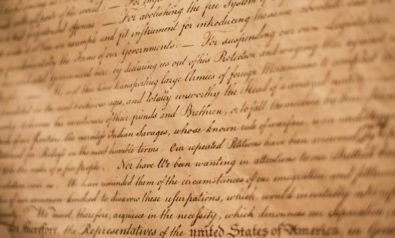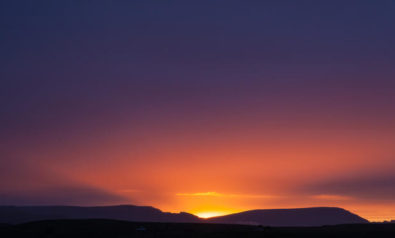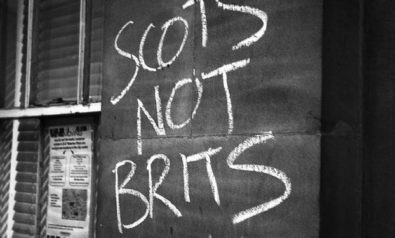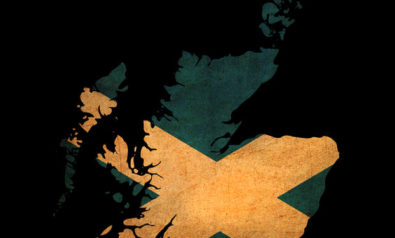The British state has sent its big guns to Scotland, and found them overwhelmed by a movement of a thousand butterflies.
The lairds came to warn us villagers to do as we were told. Then the lords came to warn us villagers to do as we were told. But we were in the fields building a rebellion.
We have now seen, on shaky mobile phone footage, the moment the British Empire finally ended. It ended with two guys on a rickshaw chasing 100 Labour MPs up Buchannan Street playing the Imperial March from Star Wars and informing bemused shoppers that their Imperial Masters Had Arrived. These imperial “masters” have no guns. They rule through deference. Without it they look exactly like what they are: overpaid middle management on a team building away day. (“OK, to get the day started, an icebreaker. Let’s all try and walk up a normal street like we are normal people. No team, not like that. Like NORMAL people.”)
This is Britain
The Daily Record looks on, its panties wet with excitement. “It’s Gordon! It’s Ed! It’s John! It’s Harriet!.” Never in the field of all human endeavor has the Daily Record seen such wonder – a hundred Labour MPs here! How they must love us! How bright must be a future illuminated by their radiating glory! Don’t think, Scotland – gawp.
Down the street, a young woman and her pal see Ed, Douglas and Johann radiating away. Spontaneously, armed with a mobile phone and a pram they go for an interview. Douglas and Johann spout soundbites unrelated to the questions asked. Ed looks on blankly. Oh, Britannia, once you conquered continents with your might. Now a lassie with a phone has you on the run.
The inky wing of the British Empire does not know what to do. Historians will psychoanalyze the columns of Alan Cochrane in The Telegraph, monitoring their descent from pompous, self-certain swagger to incoherent, panicked meltdown. The Times, The Scotsman, The Mail, the Express, all peer out at Scotland from behind their barbed wire. “We’ve threatened the price of beans, we’ve threatened the cost of mortgages, we’ve told them they won’t have Strictly, we’ve told them they can’t have an NHS. That’s the sum total of their dreams and aspirations. So why won’t these f*****g Scots STAY DOWN?”
We are the most informed citizens in the world right now. I left a meeting in Hamilton Miners’ Welfare and a retired laborer caught me on the stairs and quizzed me about what I thought the position would be with ten year bond yields in an independent Scotland.
In a room behind a locked door, behind a policeman, behind a gate, behind another policeman, a group of millionaires get together. One, an old Etonian, nominally runs the country. The others, the CEOs of big corporations, actually run the country. They decide on a strategy: terror. We. Will. Take. Your. THINGS. From. You. It’s a fair trade, of sorts – give up your chance of self-determination and in return we will give you the cheap things that you love. This is Britain.
Your Celebrities Love Us
In other news, if you look closely, Scotland has just seen the highest proportion of its population in its history registered to vote: 97%. No one “gave” them that vote. The people new to the electoral register had to put themselves there. With the most almighty help from the Radical Independence Campaign (RIC) and many more. A 72-year-old man who has never voted before. A woman who ran out of her house in her pajamas when she was told she wasn’t too late. Streets of working class people being told by Yes activists on the final day of registration that it was their last chance, them phoning their friends, going round to their neighbors doors to get them out too. Long queues outside the registration office. All barely reported.
In fact, the arch-unionist political editor of The Herald managed to run a front-page story claiming none of this happened. When his story turned out to be the hopes of a British nationalist and not an accurate reflection of Scotland in 2014, the real story – highest number of people registered to vote in Scotland’s history – did not manage to make it onto the front page. (The No campaign didn’t have a voter registration campaign.)
But at least your celebrities love us, though with a provincial love which requires no more than two brief paragraphs to explain. It is a love they express without feeling, which they believe we should receive with gratitude. Every newspaper in Scotland told us how sincere David Cameron was when he spoke of his love of the Scottish people. In a speech given to a selected group of senior figures from the financial services sector.
And beneath all this, its cause – an official No campaign so incompetent at every level, so hopelessly out of touch with its nation that it brags about the size of its phone banks. Fifty thousand Scots a week on the streets knocking doors and handing out leaflets for Yes and they’ve got phone banks. What is this – 1997? What else have they got? Pagers? Spice Girls albums? It is not that these people are stupid. It is that they really, really believed we were. A Better Together “I’m voting No because…” film is never more than 40 seconds long. They all consist of platitudes. Better together. Best of both worlds. Risk and volatility.
In their world it makes perfect sense to produce a short film targeting women which is predicated on a middle-class mother who is so disinterested in politics that she can’t even recall the name of the First Minister of Scotland. It explains the lobotomized Orwellian nature of a billboard campaign that says “I love my children so I’m voting NO.” Everything they touch falls apart. And then there is a desperate rescue attempt of some sort or another.
Send up Ed. Get David to emote. Ask the supermarkets to issue threats. Beg the banks to relocate.
Just hope the Scots really are as stupid as we think. Because if they see through this s**t they’ll realize we’re finished.
Testing the British Establishment
The scope and scale of the collapse of the No campaign is obscured only by the refusal of the print media wing of their campaign to report it.
BBC political editor Nick Robinson, a good establishment boy, had his chance to humiliate Salmond in front of the world’s media when he got to ask a pompous question about corporation tax. Unfortunately, he had completely misunderstood how corporation tax works. Salmond gave him a seven-minute lesson which left him humiliated in front of the world’s media. In an undignified turn he starts heckling Salmond. At night in his news report he shows only his question (he’d clearly taken some time to prepare that humiliating blow…) and editorializes that Salmond refused to answer. Does he think we didn’t see? Is he unaware that social media exists?
This campaign has tested the British establishment. The more it loses this campaign, the greater the test. I am truly amazed at how weak it has been, how pathetic its response. Caught somewhere between mad hyperbole about independence being a bigger threat to the world than the Great Depression and the pointless mundanity of “your shopping bill may go up by literally pennies,” is this seriously all its got?
The BBC, the banks, the newspapers, the supermarkets, the Labour Party, the Tories, the generals, the civil servants. Between them they can’t muster up either a persuasive case for the union or a believable threat.
This is like nothing I’ve ever seen. We have barely a single institution on our side, barely a newspaper, and damn few millionaires. And they are truly petrified of us.
Us? We’re over 350 totally independent campaigns, each set up by activists, each self-funded, none centrally controlled. We don’t pay too much attention to the media but learn and research from the Internet. We hold meetings (I’ve spoken at coming on for 250 public meetings in the last two years). We are the most informed citizens in the world right now. I left a meeting in Hamilton Miners’ Welfare and a retired laborer caught me on the stairs and quizzed me about what I thought the position would be with ten year bond yields in an independent Scotland. Kids can talk you through the details of the Shengen arrangement. Most of us can run you through the constitutional position of the Bank of England’s Monetary Policy Unit.
I love my family so I’m voting No? F**k off. F**k right off.
For those of you who aren’t in Scotland you may not be aware that almost the whole British establishment is now placing its hopes on Gordon Brown. “He gets them” (they think). “They like him” (they think). His tendency to believe that Scotland is just nascent Nazi Germany doesn’t phase them. It’s like the moment when the Labour Party thought that the most compelling person they had to buy a sausage roll from Greggs was Ed Balls. Which was only true because Ed Milliband was behind him in the queue.
And that has become what this campaign really is – Gordon Brown swinging his big, clunking fist at a thousand butterflies. All grunt, no connection.
Sticky Tape and Goodwill
Because that’s what we are – a thousand butterflies. None of us is strong. The guy with the mobile phone and an MP3 player terrorizing the Parliamentary Labour Party with a Darth Vader gag. The young mother making the Labour leadership look like they can’t talk to real people. A hundred brilliant jokes about David Bowie. Wish trees. Hand-made posters. The RIC leaflets we paid for by a load of £5 contributions which much of working class Scotland has had through their letterbox telling them what they know already – Britain is for the rich, Scotland can be ours.
We are a campaign held together with sticky tape and goodwill. We’re all broke (we give all our money away). We’re all exhausted (we’ve haven’t rested in two years). Not one of us is scared. Not one of us needs anyone’s permission. And we never underestimate the people of Scotland.
This is like nothing I’ve ever seen. We have barely a single institution on our side, barely a newspaper, and damn few millionaires. And they are truly petrified of us.
A butterfly rebellion is coming close to winning Scotland away from the forces of the British state. I think we’ll do it, but either way, they can’t beat us. We are already half of Scotland and we keep growing. They are weak and we are strong. When the people of Britain see their titans defeated by a rebel army who used infographics and humor, what is there to stop them following? England needs its butterfly rebellion as well.
The lairds came to tell us what was good for us. The lords came to tell us what was good for us. In the fields, we already knew what was good for us. Not this. Not Britain. Our rebels grabbed whatever they had and did whatever they could.
You can’t beat a thousand butterflies with a gun. But you can beat a gun with a thousand butterflies.
*[This article was originally published by openDemocracy.]
The views expressed in this article are the author’s own and do not necessarily reflect Fair Observer’s editorial policy.
Support Fair Observer
We rely on your support for our independence, diversity and quality.
For more than 10 years, Fair Observer has been free, fair and independent. No billionaire owns us, no advertisers control us. We are a reader-supported nonprofit. Unlike many other publications, we keep our content free for readers regardless of where they live or whether they can afford to pay. We have no paywalls and no ads.
In the post-truth era of fake news, echo chambers and filter bubbles, we publish a plurality of perspectives from around the world. Anyone can publish with us, but everyone goes through a rigorous editorial process. So, you get fact-checked, well-reasoned content instead of noise.
We publish 2,500+ voices from 90+ countries. We also conduct education and training programs
on subjects ranging from digital media and journalism to writing and critical thinking. This
doesn’t come cheap. Servers, editors, trainers and web developers cost
money.
Please consider supporting us on a regular basis as a recurring donor or a
sustaining member.
Will you support FO’s journalism?
We rely on your support for our independence, diversity and quality.













Comment